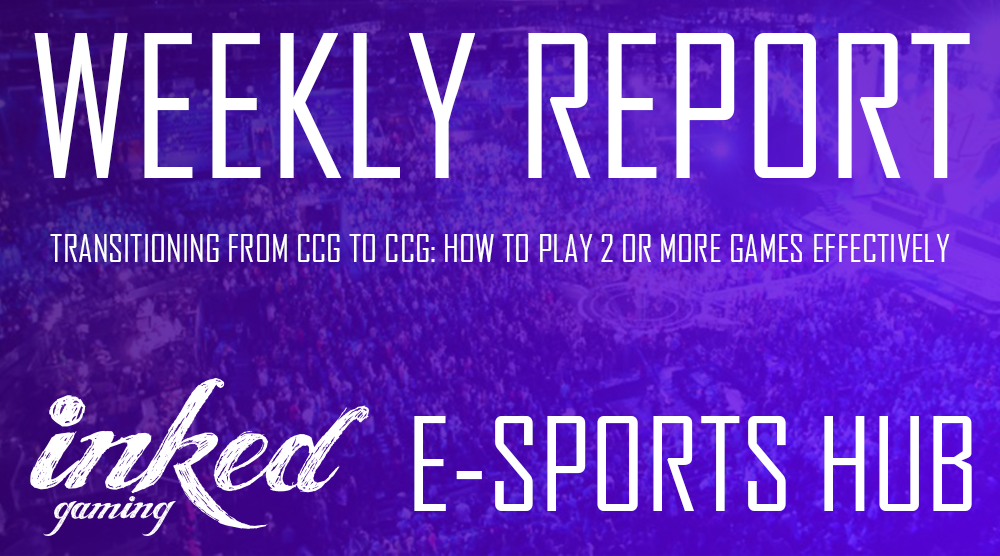Admin IG
Transitioning From CCG To CCG: How To Play 2 Or More Games Effectively

For a very long time, “I've had people ask me how do I manage to stay at a high level with multiple games, is it just playing a lot?” “Is it about prioritizing one more then another, or is it really just not possible to split your focus without sacrificing somewhere”. For those unfamiliar, I’m NotoriousGHP and I’ve been competing in various games for a very long time. I’ve primarily focused on card games, and really came into my own in the last two years or so. I’ve competed in card games like Eternal, Magic: The Gathering, Hearthstone, Yu-Gi-Oh and The Elder Scrolls legends, and also games such as Teamfight Tactics. The biggest talking point of all of this, is that I almost always have a split focus. For example right now, I am playing Eternal and Magic: The Gathering tournaments and a weekly Hearthstone League. For me this is normal and not a hindrance since I’ve been doing it so long. But in reality, is this a good idea?
I love to compete, that’s what drives me to play any sort of game and card games have always been a great competitive outlet. I started branching out into other games once I realized certain games didn’t have many or any tournaments, and I needed that itch to be scratched further. Once I started trying other games, it became a situation of how many events I could play instead of how many I should play and for a long time, it resulted in all of my skill levels dropping, but things have changed.
The biggest thing I had to realize was that most of the time, there isn’t a tournament everyday and I should treat things as such. What this really means is knowing what’s coming up -- if I know the next three weekends I'll be playing a Magic event, and the next Eternal Tournament is next month, I can safely prioritize Magic. This could mean consuming more content, playing more Magic, or simply playing less of other games so the primary knowledge that gets remembered match to match is Magic, as less junk will be floating around my brain. Sometimes this doesn’t work,and I end up playing two tournaments in the same day which requires a whole different kind of prep.
When I'm faced with the task of two tournaments in a day, often they are both events I've qualified for -- otherwise I'd recommend sitting out of one them. Playing multiple tournaments in the same day is simply taxing, between juggling different games and their mindsets, to knowing what cards to play around to your stress levels. This is the point where I claim seriously grinding multiple games goes too far. When preparing for multiple tournaments in the same time frame, I typically prioritize the one with more value (for example, a Magic Pro Tour Qualifier) and try to at least figure out my deck of choice quickly. Then I'll try to figure out the deck I’d like to play for the other event, and split the rest of the time between both games just playing games. In a situation like this, muscle memory is super important for how to play your deck, as you never will have 100% undivided attention. If you build up enough muscle memory, you’ll find yourself making less small mistakes because you understand the fundamentals of your deck, such as sequencing, without it being a point you think too hard about.
In a situation where you have to split your attention, I highly recommend trying to eliminate as many things you have to think about as possible. This could be things like the already mentioned build up of muscle memory, having a sideboard guide or powering down and disconnecting from things like Facebook or Discord. All these things help you focus on what’s in front of you, without causing you to fixate on the fundamentals. Not every game has a sideboard, but having access to any resource at all that could help you should be accessed instead of trying to remember or figure it out in the moment. In Eternal, often you have access to your opponents deck list. So please, stare and observe that. Or, in Hearthstone you can use a deck tracker, so utilize this resource instead of wondering what’s left in my deck. This may seem super basic, but so many players don’t utilize the resources they freely have at their disposal, and start to make mistakes because there putting their focus on to many things at once.
When it comes to just regularly playing multiple games, the biggest thing to realize is you need to play enough of both to stay up on the MetaGame, but not enough to totally burn out. Funny enough, the best way to play multiple games at a high level in my opinion is to do something besides playing competitive games. Maybe it’s reading, running, D&D or whatever other hobby you can come up with, but you have to find something else you regularly do besides grinding these competitive games. If you don’t, burn out is incredibly easy to have occurred and is something I have really struggled with in the past before learning to accommodate it.
This biggest problem with trying to manage more than one game is definitely burn out, either finding one game you prefer then the other and burning yourself out because you’re forcing yourself to play the less enjoyed game, or you simply are playing to much. Although games are meant to be fun, when you start playing the game competitively they can take a serious tole on your mental health and burnout is a huge cause of this. When I was playing the Eternal World Championship Qualifiers, I often found myself regardless of the result feeling horrible after the event due to how much work I'd put in without taking breaks, doing other things or socializing and because it felt like it something I HAD to win, not something I wanted to win.
On the outside, juggling multiple games seems easy. But once you begin, you notice how often you’ll confuse yourself, maybe playing around a card from another game or forgetting exactly how two cards interact with each other. You’ll also find yourself taxed for time until you get used to splitting your time. One thing that people don’t seem to realize is knowledge builds between games. Let's say in theory you spend 4 hours on game A, and 4 hours on game B today. This doesn’t mean that you only received 4 hours of relevant knowledge for each game, as things like card game theory and fundamentals often translate into your other games.
If you have the time, I can’t say I recommend playing multiple games competitively as it draws focus away from the games you want to succeed at. However, if you choose to explore playing multiple competitive games, you can do so in a healthy way. It’s okay to take a break from a game, or even all of your games from time to time to do other things and realize that there are other things going on in our lives and that it's up to you how much work you want to put in. It can be incredibly rewarding to juggle multiple games, but also very taxing. I can’t imagine playing games any other way.



0 Comments